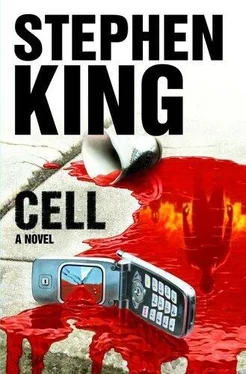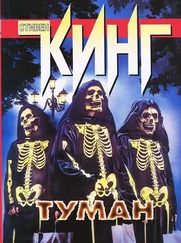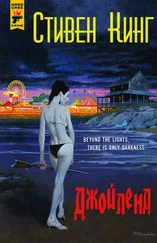"Yes." Clay knew that he would have been safe with her, too, but he understood what Tom was talking about. "I'm going to head north tomorrow morning as soon as it's light. It would probably be a good idea if you and Alice came with me."
Tom thought about this briefly, then asked, "What about her father?"
"She says he's, quote, 'very self-reliant.' Her biggest stated worry on his behalf was what he rolled himself for dinner. What I heard under that is that she isn't ready to know. Of course we'll have to see how she feels about it, but I'd rather keep her with us, and I don't want to head west into those industrial towns."
"You don't want to head west at all."
"No," Clay admitted.
He thought Tom might argue the point, but he didn't. "What about tonight? Do you think we should stand a watch?"
Clay hadn't even considered this until now. He said, "I don't know how much good it would do. If a crazed mob comes down Salem Street waving guns and torches, what can we do about it?"
"Go down cellar?"
Clay thought it over. Going down cellar seemed awfully final to him– the Bunker Defense—but it was always possible the hypothetical crazed mob under discussion would think the house deserted and go sweeping by. Better than being slaughtered in the kitchen, he supposed. Maybe after watching Alice get gang-raped.
It won't come to that, he thought uneasily. You're getting lost among the hypothetical, that's all. Freaking in the dark. It won't come to that.
Except Boston was burning to the ground behind them. Liquor stores were being looted and men were beating each other bloody over aluminum kegs of beer. It had already come to that.
Tom, meanwhile, was watching him, letting him work it through . . . which meant that maybe Tom already had. Rafe jumped into his lap. Tom put his sandwich down and stroked the cat's back.
"Tell you what," Clay said. "If you've got a couple of comforters I can bundle up in, why don't I spend the night out there on your porch? It's enclosed, and it's darker than the street. Which means that I'd likely see anyone coming long before they saw me watching. Especially if the ones coming were phone-crazies. They didn't impress me as being into stealth."
"Nope, not the creep-up-on-you type. What if people came from around in back? That's Lynn Avenue just a block over."
Clay shrugged, trying to indicate that they couldn't defense against everything—or even very much—without saying so right out loud.
"All right," Tom said, after eating a little more of his sandwich and feeding a scrap of ham to Rafe. "But you could come get me around three. If Alice hasn't woken up by then, she might sleep right through."
"Why don't we just see how it goes," Clay said. "Listen, I think I know the answer to this, but you don't have a gun, do you?"
"No," Tom said. "Not even a lonely can of Mace." He looked at his sandwich and then put it down. When he raised his eyes to Clay's, they were remarkably bleak. He spoke in a low voice, as people do when discussing secret things. "Do you remember what the cop said just before he shot that crazy man?"
Clay nodded. Hey, buddy, how ya doin? I mean, what the haps? He would never forget it.
"I knew it wasn't like in the movies," Tom said, "but I never suspected the enormous power of it, or the suddenness . . . and the sound when the stuff. . . the stuff from his head . . ."
He leaned forward suddenly, one small hand curled to his mouth. The movement startled Rafer, and the cat leaped down. Tom made three low, muscular urking sounds, and Clay steeled himself for the vomiting that was almost sure to follow. He could only hope he wouldn't start vomiting himself, but he thought he might. He knew he was close, only a feather-tickle away. Because he knew what Tom was talking about. The gunshot, then the wet, ropy splatter on the cement.
There was no vomiting. Tom got control of himself and looked up, eyes watering. "I'm sorry," he said. "Shouldn't have gone there."
"You don't need to be sorry."
"I think if we're going to get through whatever's ahead, we'd better find a way to put our finer sensibilities on hold. I think that people who can't do that . . ." He stopped, then started again. "I think that people who can't do that. . ." He stopped a second time. The third time he was able to finish. "I think that people who can't do that may die."
They stared at each other in the white glare of the Coleman lamp.
10
" Once we left the city, I didn't see anyone with a gun," Clay said. "At first I wasn't really looking, and then I was."
"You know why, don't you? Except maybe for California, Massachusetts has got the toughest gun law in the country."
Clay remembered seeing billboards proclaiming that at the state line a few years ago. Then they'd been replaced by ones saying that if you got picked up for driving under the influence, you'd have to spend a night in jail.
Tom said, "If the cops find a concealed handgun in your car—meaning like in the glove compartment with your registration and insurance card—they can put you away for I think seven years. Get stopped with a loaded rifle in your pickup, even in hunting season, and you could get slapped with a ten-thousand-dollar fine and two years of community service." He picked up the remains of his sandwich, inspected it, put it back down again. "You can own a handgun and keep it in your home if you're not a felon, but a license to carry? Maybe if you've got Father O'Malley of the Boys' Club to cosign, but maybe not even then."
"No guns might have saved some lives, coming out of the city."
"I agree with you completely," Tom said. "Those two guys fighting over the keg of beer? Thank God neither of them had a .38."
Clay nodded.
Tom rocked back in his chair, crossed his arms on his narrow chest, and looked around. His glasses glinted. The circle of light thrown by the Coleman lantern was brilliant but small. "Right now, however, I wouldn't mind having a pistol. Even after seeing the mess they make. And I consider myself a pacifist."
"How long have you lived here, Tom?"
"Almost twelve years. Long enough to see Malden go a long way down the road to Shitsville. It's not there yet, but boy, it's going."
"Okay, so think about it. Which of your neighbors is apt to have a gun or guns in their house?"
Tom answered promptly. "Arnie Nickerson, across the street and three houses up. NRA bumper sticker on his Camry—along with a couple of yellow ribbon decals and an old Bush-Cheney sticker—"
"Goes without saying—"
"And two NRA stickers on his pickup, which he equips with a camper cap in November and takes hunting up in your part of the world."
"And we're happy to have the revenue his out-of-state hunting license provides," Clay said. "Let's break into his house tomorrow and take his guns."
Tom McCourt looked at him as though he were mad. "The man isn't as paranoid as some of those militia types out in Utah—I mean, he does live in Taxachusetts—but he's got one of those burglar alarm signs on his lawn that basically says DO YOU FEEL LUCKY, PUNK, and I'm sure you must be familiar with the NRA's stated policy as to just when their guns will be taken away from them."
"I think it has something to do with prying their cold dead fingers—"
"That's the one."
Clay leaned forward and stated what to him had been obvious from the moment they'd come down the ramp from Route One: Malden was now just one more fucked-up town in the Unicel States of America, and that country was now out of service, off the hook, so sorry, please try your call again later. Salem Street was deserted. He had felt that as they approached . . . hadn't he?
Читать дальше








